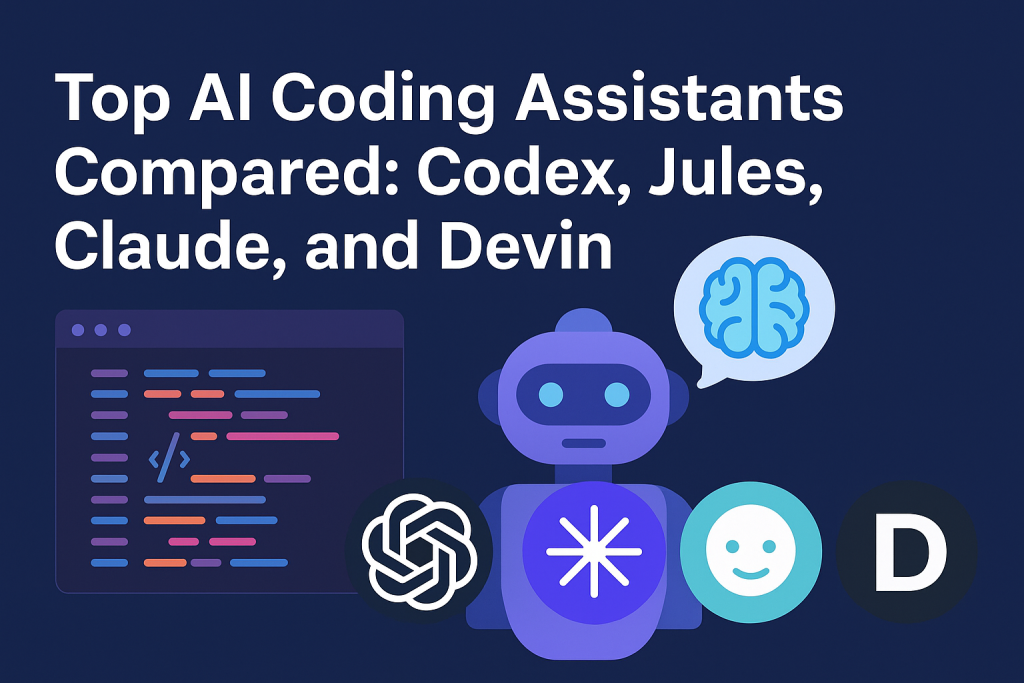
Introduction
AI coding tools are transforming how developers work, automating tasks like code generation, debugging, and refactoring. Among the leaders are OpenAI Codex, Google Jules, Anthropic’s Claude Code, and Cognition’s Devin. These tools promise to boost productivity, but which one suits your needs? This blog post compares their features, strengths, and ideal use cases, helping you choose the right assistant for your coding projects. Whether you’re a solo developer or part of an enterprise team, read on to discover how these tools stack up.
Comparison
OpenAI Codex
Overview: Codex, launched in May 2025, is OpenAI’s AI coding agent for automating tasks in a cloud-based sandbox.
- Supports 12+ languages (e.g., Python, JavaScript, Go).
- Handles multiple tasks like bug fixing and refactoring simultaneously.
- Available to ChatGPT Pro, Enterprise, and Team users.
Best For: Enterprise developers needing secure, multi-task automation in a sandboxed environment.
Google Jules
Overview: Jules, Google’s beta SWE-Agent (May 2025), operates in a virtual Ubuntu environment for coding tasks.
- Offers 5 free tasks daily with GitHub integration.
- Supports Node.js, Python, Go, Java, and Rust.
- Breaks down complex tasks into sub-tasks.
Best For: Developers seeking free, cloud-based coding with strong GitHub workflows.
Anthropic’s Claude Code
Overview: Claude Code, released in February 2025, excels in frontend development and context-aware coding.
- Strong natural language interaction for code generation.
- Reliable debugging and frontend-focused outputs.
- Multi-model support for flexible workflows.
Best For: Frontend developers wanting intuitive, context-sensitive coding assistance.
Cognition’s Devin
Overview: Devin 2.0 is an interactive AI coding agent with a cloud-based IDE for collaborative development.
- Features Interactive Planning and Devin Search for task refinement.
- Shows transparent terminal logs and test outputs.
- Supports parallel task execution with internet connectivity.
Best For: Developers needing an interactive, internet-enabled IDE for complex projects.
Comparison Table
| Tool | Languages Supported | Internet Connectivity | Pricing/Access | Key Integration |
|---|---|---|---|---|
| OpenAI Codex | 12+ (Python, JS, Go, etc.) | No (sandboxed) | ChatGPT Pro/Enterprise/Team | GitHub (limited) |
| Google Jules | Node.js, Python, Java, etc. | Yes | 5 free tasks/day, subscription TBD | GitHub |
| Claude Code | Broad, frontend-focused | Limited | Subscription-based | Multiple AI models |
| Devin | Broad, multi-language | Yes | Subscription-based | Cloud IDE, GitHub |
Conclusion
Each AI coding tool shines in unique ways. Codex is ideal for enterprise-grade, secure automation but lacks internet access. Jules offers free tasks and excellent GitHub integration, perfect for budget-conscious developers. Claude Code excels in frontend tasks with intuitive interactions, while Devin’s interactive IDE suits complex, collaborative projects. Choose Codex for enterprise needs, Jules for free-tier access, Claude for frontend work, or Devin for interactive flexibility. Try them out to see which fits your workflow best!
